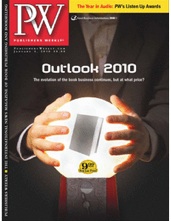LJ and SLJ Have A Buyer
It’s been a long and tortuous road, but it was announced today that Library Journal, School Library Journal and LJ Hotline have been sold to Media Source, which also owns The Horn Book and Junior Library Guild.
Horn Book Editor-in-Chief, Roger Sutton celebrated the acquisition by posting a photo of himself and LJ/SLJ Editorial Director, Brian Kenney at MidWinter with a typically wry Suttonesque headline, Many men have tried to mix us up but no one can.
Kenney continues as editorial director of both magazines, with Francine Fialkoff as editor-in-chief of Library Journal. Ron Shank continues as publisher.
LJ and SLJ were originally put up for sale, along with 45 other magazines, by owner Reed Business Information back in 2008. Unable to find buyers, in what is widely considered a bungled attempt, Reed took them off the table. This past July, they announced they were trying it again. Since then, they’ve sold off several magazines, including Electronic Design News (EDN) and Broadcasting & Cable, and closed others, including Video Business. The magazines were formerly part of Cahners, which published over 150 magazines at its height.
Noticeably missing from the sale is sister publication Publishers Weekly. Some news sources see this as a sign that Reed has been unable to find a buyer for the magazine and predict it will be closed, a step Reed said they would take with any magazines they were unable to sell by mid-year.
It would be a shame if PW was closed, not just because it’s been covering the publishing business since 1872, or because I am one of the former editors-in-chief. Despite a drastic reduction in staff over the past few years, it still has the largest number of reporters and editors focused on all aspects of the business, from printing to bookselling. Several online publications have challenged PW‘s coverage, most notably Publishers Marketplace and Shelf Awareness (which, ironically, had its first incarnation as PW Daily for Booksellers; when the management laid off editor John Mutter and closed the publication, they effectively set up a competitor), but PW still does more original reporting than any of them. Successful PW online publications Children’s Bookshelf and Cooking the Books point to opportunities to create other niche publications.
And, with all the magazines Reed is trying to sell off, they simply may not have had the time to work with potential buyers of single publications. The outlook may be murky, but don’t write PW off just yet.

